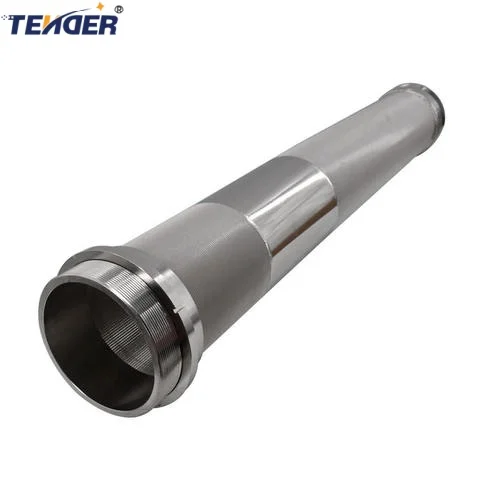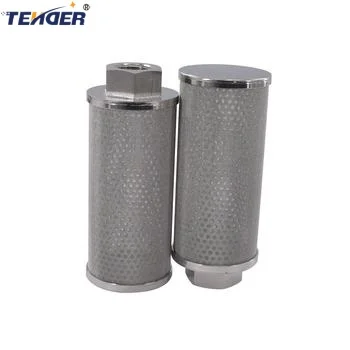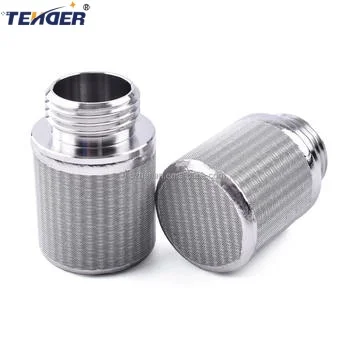Unveiling the Power of Advanced Filtration
In high-stakes industrial environments, precision filtration is not just a preference, it's a necessity. Introducing the Sintered Mesh Filter Element – a robust and highly efficient solution engineered to meet the most demanding filtration challenges. This porous structure is crafted by meticulously pressing multiple layers of metal wire mesh, typically stainless steel, followed by a high-temperature vacuum sintering process. The result is a filter with unparalleled structural integrity, uniformly distributed pores, exceptional mechanical strength, and superior filtration accuracy, making it resistant to high temperatures and corrosive media.

From petrochemicals to pharmaceuticals, food processing to water treatment, and even in aviation and energy sectors, the demand for reliable and durable filtration is constant. The unique properties of a sintered wire mesh filter address these needs by effectively filtering liquids, gases, and vapors, ensuring product purity, equipment protection, and process efficiency.
The Precision Behind the Product: Manufacturing Process
The creation of a sintered mesh filter is a testament to advanced material science and engineering. This intricate process ensures the consistent quality and performance critical for industrial applications.
Key Materials:
· Stainless Steel: Predominantly 304, 316, 316L for superior corrosion resistance and strength.
· Special Alloys: Hastelloy, Inconel, Monel for extreme temperature and highly corrosive environments.
Manufacturing Steps:
1. Mesh Weaving: Precision weaving of fine metal wires into various mesh counts and patterns (e.g., plain weave, twilled weave).
2. Layer Stacking: Multiple layers of wire mesh are carefully stacked, often combining different mesh sizes to achieve specific filtration characteristics (e.g., protective layer, control layer, support layer, drainage layer, skeleton layer in a 5 layer sintered wire mesh).
3. Pressing: The stacked layers are compressed under high pressure to create intimate contact between the wire intersections.
4. Vacuum Sintering: The compressed stack is then transferred to a high-temperature vacuum furnace. Here, the metal wires are heated to just below their melting point, causing them to bond metallurgically at their contact points. This creates a highly stable, rigid, and uniformly porous structure without altering the original pore size distribution.
5. Forming & Fabrication: The sintered plates are cut, rolled, welded, and shaped into specific filter elements (e.g., cartridges, discs, cones) according to design specifications.
6. Quality Control & Testing: Each sintered mesh filter undergoes rigorous testing.
Testing Standards & Service Life:
Testing adheres to industry standards such as ASTM F795 for bubble point tests, ensuring uniform porosity and pore size. Performance tests also include permeability, dirt holding capacity, and pressure drop. With proper maintenance and application, a sintered wire mesh filter can offer an exceptionally long service life, often several years, significantly reducing replacement costs and downtime compared to conventional filters.
Why Choose Sintered Wire Mesh Filters? Unmatched Advantages
The superior design and manufacturing process of a sintered wire mesh filter translate into a host of compelling advantages for industrial applications:
· High Mechanical Strength & Rigidity: Unlike conventional mesh, the sintered structure can withstand high differential pressures without deformation, eliminating the need for additional support frames.
· Exceptional Heat Resistance: Operates effectively in extreme temperatures ranging from -200°C to 480°C.
· Superior Corrosion Resistance: Excellent compatibility with aggressive chemicals, acids, and alkalis, especially with stainless steel and special alloy constructions.
· Precise Filtration Accuracy: Uniform pore sizes ensure consistent and accurate filtration, ranging from 0.5 to 300 microns.
· Excellent Backwash Performance: The rigid, open-pore structure allows for efficient backwashing and regeneration, extending service life and reducing operational costs.
· High Porosity & Permeability: Facilitates high flow rates with minimal pressure drop.
· Weldability & Fabricability: Can be easily cut, welded, and formed into various shapes and sizes to meet specific application requirements.
· Long Service Life: Durable construction and cleanability lead to extended operational periods and reduced replacement frequency.

Technical Specifications & Performance Data
Understanding the granular details of a sintered mesh filter element is crucial for optimal system integration.
Typical Product Parameters for Sintered Mesh Filter Element:
|
Parameter |
Specification |
|
Material |
SS304, SS316, SS316L (Standard); Hastelloy, Inconel, Monel (Optional) |
|
Filter Layers |
Typically 5-layer (protective, control, dispersion, two support layers); Customizable |
|
Filtration Rating |
0.5 µm to 300 µm (Absolute or Nominal) |
|
Working Temperature |
-200°C to 480°C |
|
Max Differential Pressure |
Up to 25 MPa (depending on design and material) |
|
Shape/Form |
Cartridges, Discs, Cones, Sheets, Tubes, Pleated elements |
|
Thickness (Standard Sheet) |
1.7 mm, 2.0 mm, 3.5 mm (Customizable) |
|
Pore Structure |
Uniform, stable, high porosity (30-90%) |
|
Cleanability |
Excellent backwash capabilities; Steam, ultrasonic, chemical cleaning |
Test Data & Standards: Performance data is typically backed by tests for bubble point (ASTM F795), permeability, dirty capacity, and filter efficiency (ISO 16889). Adherence to authoritative standards like ISO 9001 (Quality Management) and relevant material certifications (e.g., ASME for pressure vessels components) ensures consistent product quality and reliability.
Applications Across Diverse Industries
The versatility and robustness of a sintered mesh filter element make it indispensable across a multitude of critical industrial sectors:
· Petrochemical & Oil & Gas: Filtration of process fluids, catalysts recovery, gas purification, and polymer filtration in high-temperature and high-pressure environments.
· Pharmaceuticals: Sterilization filtration of liquids and gases, catalyst recovery, active pharmaceutical ingredient (API) separation, and solvent purification. Usage scenarios include fermentation broth filtration and sterile air filtration.
· Food & Beverage: Clarification of beverages, syrup filtration, steam filtration, and edible oil processing.
· Water Treatment: Pre-filtration for reverse osmosis, deep well injection, and purification of industrial wastewater.
· Chemical Industry: Filtration of corrosive chemicals, separation of solid particles from liquids, and high-purity chemical production.
· Power Generation: Steam filtration, turbine oil filtration, and boiler feedwater purification.
· Aerospace & Aviation: Hydraulic fluid filtration, fuel filtration, and cabin air filtration systems.
· Plastics & Polymer: Melt filtration to remove impurities and ensure product quality in extrusion processes.
· Environmental Protection: Dust removal, exhaust gas filtration, and particulate control.
These usage scenarios highlight the critical role of sintered mesh in safeguarding processes, protecting expensive equipment, and ensuring end-product quality.
Customization & Tailored Solutions
Understanding that no two industrial applications are identical, customization is a cornerstone of our offering for sintered wire mesh filters. We provide tailored solutions to precisely match your specific process requirements.
Customization Options Include:
· Material Selection: Choice of Stainless Steel grades (304, 316, 316L), Hastelloy, Inconel, Monel, and other alloys for specific chemical compatibility and temperature resistance.
· Dimensions: Custom diameters, lengths, and shapes for various filter housing designs.
· Filtration Rating: Precise control over pore size from 0.5 µm to 300 µm to achieve desired filtration accuracy.
· Layer Configuration: Tailoring the number and arrangement of mesh layers (e.g., specific 5 layer sintered wire mesh designs) for optimized flow, mechanical strength, and backwashability.
· End Connections: Various end cap designs, thread types, and flange connections to ensure seamless integration into existing systems.
· Surface Treatment: Options for electropolishing or special coatings to enhance surface finish or specific resistances.
Our engineering team works closely with clients to design and manufacture sintered mesh filter elements that deliver optimal performance and cost-efficiency for their unique applications.
Vendor Comparison: Choosing the Right Partner
Selecting a supplier for your sintered wire mesh filter needs is a critical decision. Beyond price, factors like quality, experience, and support significantly impact long-term operational success.
Key Vendor Comparison Factors:
|
Feature |
Our Offering |
Typical Competitor |
|
Manufacturing Experience |
Decades of specialized experience in sintered media |
Varies; often generalized filter manufacturers |
|
Quality Certifications |
ISO 9001, Material Certs, ASTM F795 compliance |
May have basic ISO; less specific material testing |
|
Customization Capability |
Extensive (material, size, micron, layers, end caps) |
Limited standard options |
|
Lead Time |
Competitive, with expedited options for critical needs |
Often longer for non-standard items |
|
Technical Support |
Dedicated engineering support & application specialists |
Basic sales support |
|
After-Sales Service |
Warranty, cleaning guidance, troubleshooting, training |
Primarily product replacement |
|
Price vs. Value |
Optimized TCO through durability & performance |
Lower initial cost, but higher long-term expenses |
Certifications: Our products are manufactured under strict ISO 9001:2015 quality management systems. Materials used comply with international standards, and filter performance is validated through various testing protocols, including bubble point, permeability, and dirt holding capacity tests, ensuring every sintered mesh filter meets or exceeds expectations.
Real-World Case Studies
The performance of sintered mesh filter elements is best demonstrated through their successful deployment in challenging environments.
· Catalyst Recovery in Chemical Plant: A major chemical manufacturer faced significant catalyst loss during processing. Implementing a custom-designed sintered mesh filter with a 10µm rating resulted in over 99% catalyst recovery, drastically reducing raw material costs and environmental impact.
· High-Temperature Polymer Melt Filtration: An automotive plastics supplier struggled with impurities in their polymer melt at 300°C, leading to product defects. Switching to a durable sintered wire mesh filter cartridge significantly improved melt purity, reducing rejection rates by 15% and extending filter service life by 3x.
· Sterile Air Filtration in Biopharmaceutical Production: A pharmaceutical company required ultra-clean air for its fermentation tanks. Our sintered mesh filter element, configured for sterile gas applications, provided consistent 0.2µm filtration, meeting stringent regulatory requirements and ensuring product integrity.

Customer Feedback & Testimonials
Our clients consistently report enhanced operational efficiency and reliability after implementing our sintered mesh filter solutions.
"The durability of their sintered wire mesh filters is outstanding. We've seen a dramatic reduction in filter replacement frequency, saving us significant time and maintenance costs in our chemical processing plant."
– Operations Manager, Petrochemical Sector
"Their technical team helped us customize a sintered mesh filter element that perfectly fit our unique high-temperature gas filtration needs. The performance has been flawless."
– Lead Engineer, Aerospace Industry
Frequently Asked Questions (FAQs)
Q: What is the typical service life of a sintered mesh filter?
A: With proper operation and regular cleaning, a sintered wire mesh filter can last for several years, often exceeding 5 years, making it a highly cost-effective solution.
Q: How do I clean a sintered mesh filter element?
A: Sintered filters are highly cleanable. Common methods include backwashing (reverse flow), ultrasonic cleaning, chemical cleaning, or steam cleaning, depending on the contaminant and application.
Q: What is the delivery time for custom sintered mesh filters?
A: Delivery times vary based on complexity and order volume. Standard items typically ship within 2-4 weeks. Custom orders may take 4-8 weeks. Please contact our sales team for precise lead times.
Q: What is your warranty and after-sales support policy?
A: We offer a comprehensive warranty against manufacturing defects. Our dedicated after-sales support includes technical assistance, troubleshooting, and guidance on optimal cleaning and maintenance procedures to ensure long-term performance of your sintered wire mesh filters.
Conclusion: Invest in Superior Filtration
The Sintered Mesh Filter Element stands as a pinnacle of filtration technology, offering unmatched durability, precision, and performance in the most challenging industrial environments. Its robust construction, resistance to extreme conditions, and exceptional cleanability translate into significant operational efficiencies and cost savings. For any process requiring reliable, long-lasting, and high-performance filtration, the sintered mesh filter is not just a component, but a strategic investment in purity and productivity.
References
1. ASTM F795-09(2018) Standard Test Method for Determining the Performance of a Filter Medium by a Bubble Point Test. ASTM International.
2. ISO 16889:2008 Hydraulic fluid power — Filters — Multi-pass method for evaluating filtration performance of a filter element. International Organization for Standardization.
3. ISO 9001:2015 Quality management systems — Requirements. International Organization for Standardization.
4. ASME Boiler and Pressure Vessel Code (BPVC), Section VIII, Division 1 – Rules for Construction of Pressure Vessels. American Society of Mechanical Engineers.
Anping Tengde Metal Wire Mesh Products Co., Ltd. Has been dedicated to the production and research and development of wire mesh products for 30 years. Leading Vibrating Screen It is a comprehensive department integrating production and processing, distribution and wholesale. Stainless steel mesh series, wire mesh products series, and filter elements and filter materials. Wire MeshWe can also produce various special-shaped net types and deep-processed net products according to customer needs and requirements. wire mesh suppliers All our products leaving the factory have undergone strict inspection to ensure that they are 100% qualified. Filtration Screens ManufacturerThe company adheres to the business philosophy of “technology leadership and quality victory”, and has nearly a hundred MID-to-senior level professional and technical personnel. wire mesh manufacturer We have maintained long-term and good cooperative relations with large domestic oil fields, coal mines, petroleum, machinery, chemical and other units, and have established good trade relations with more than 70 countries including the United States, Japan, Russia and Australia. Anping Tengde Metal Wire Mesh Products Co., Ltd.wire mesh screens suppliers Will continue to adhere to the tenet of “customer first, integrity-based”, and with the spirit of continuous innovation and win-win cooperation, forge ahead and challenge the future.wire mesh filter manufacturers|mesh wire suppliers